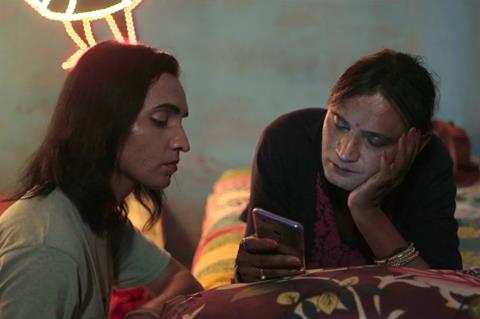Indian drama from Bhopal grassroots group Ektara Collective follows two transgender women after they’re evicted from their home

Dir: Ektara Collective. India, UK. 2022. 91mins
Set in Bhopal, in the central Indian state of Madhya Pradesh, the drama A Place Of Our Own (Ek Jagah Apni), from the Bhopal-based Ektara Collective, follows trans women Laila (Manisha Soni) and Roshni (Muskaan) as they seek to find alternative accommodation when their landlord evicts them without notice. It highlights the harassments and discriminations with which they must contend every day, but also dives deeper to give a rounded portrait of lives which swing between a persistent sense of strife and moments of joy.
The film’s real power lies in its plain, unpretentious sincerity
This is the second feature from Ektara Collective, an independent collaborative of filmmakers which makes films about and involving marginalised and disenfranchised communities, following 2017’s Checkmate. Supported by fellowships, artist support grants including reFrame’s Genderalities and crowdfunding, A Place Of Our Own won a Special Mention at the Work-In-Progress Lab at NFDC Film Bazaar 2021 before being showcased as part of this year’s NFDC Goes To Cannes Initiative. After its world premiere at Tokyo, it now plays in competition at the International Film Festival of Kerala (IKFF).
As with Ektara Collective’s previous films, A Place Of Our Own seeks to turn cinema into a tool of empowerment by putting the transgender community in charge of its own story. Trans women Manisha Soni and Muskaan are cast alongside non-professional actors in key roles, and the screenplay — which draws from real-life experiences including the Covid-19 crisis — has been written by Maheen Mirza and Rinchin in consultation with the actors.
That means that, as Laila and Roshni go about trying to find a new home, the film explores their supportive friendships as well as the toxic workplaces and uncaring families that have cast them aside. Alongside issues of gender and sexuality, there is also the ambit of caste- and class-based inequities and injustices. The search for a home becomes a metaphor for Laila and Roshni attempts to assert themselves and seize their rightful place in a prejudiced world.
There are a few elaborately mounted confrontation scenes, such as when a seemingly liberal journalist attempts to conduct a deliberately provocative interview with the pair. Yet more throwaway moments have a bigger impact; Laila pointing out an isolated house on an island as an ideal home, away from the glare of civilisation. The film’s real power, however, lies in its plain, unpretentious sincerity, which enables a viewer to empathise with the frustrations of Laila and Roshni and admire their humour and grace in adversity. They never succumb to cynicism or bitterness, defeat or victimisation.
Filmmaking is accomplished and technically skilled, without seeking to refine the rough and ready context of the narrative. Ektara Collective also eschews unnecessary complexity; performances are natural, plot is straightforward, and dialogue is in simple spoken Hindi.
It’s bolstered by a lovely soundtrack, whose compositions by a varied set of musicians is rooted in Indian syncretic culture—songs like ’Begumpura’, for example, based on poet-saint Raidas’ lyrical vision of social harmony. Music runs like a stream through the film, a philosophical rebuttal to the differences and discriminations critiqued in its story.
Production company: Ektara Collective, Lotus Visual Productions
Contact: Ektara Collective ektaracollective@gmail.com
Producer: Neeraj Churi, Reframe Genderalities, Hassath, Rinchin Rinchin, Sushil
Screenplay: Rinchin, Maheen Mirza
Cinematography: Maheen Mirza
Editing: Paramita Ghosh
Production design: Kanak Shashi, Madhu Dhurve
Music: Priyanka Gaikwad, Aniket Mohite, Sheetal Saathe, Lata Sangade, Devnarayan Saloriya, Anubhuti Sharma
Main cast: Manisha Soni, Muskaan, Aakash Jamra







![The Brightest SunScreen[Courtesy HKIFF]](https://d1nslcd7m2225b.cloudfront.net/Pictures/274x183/3/5/0/1448350_thebrightestsunscreencourtesyhkiff_312678.jpg)















![The Brightest SunScreen[Courtesy HKIFF]](https://d1nslcd7m2225b.cloudfront.net/Pictures/100x67/3/5/0/1448350_thebrightestsunscreencourtesyhkiff_312678.jpg)
